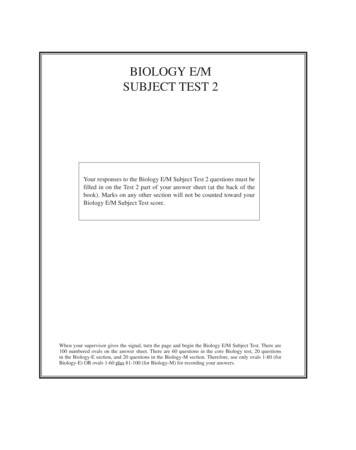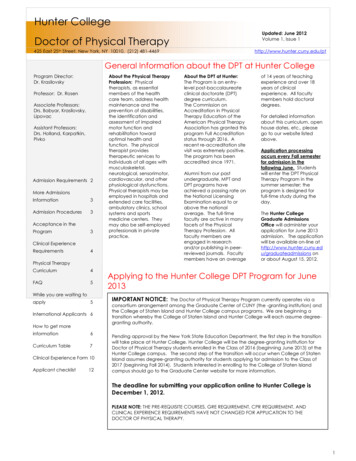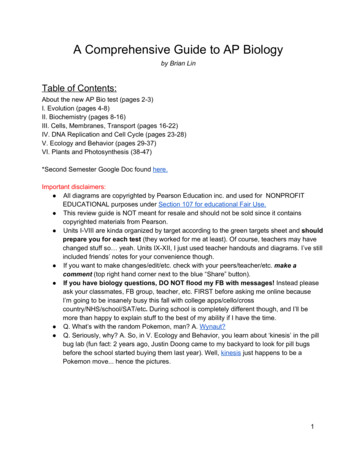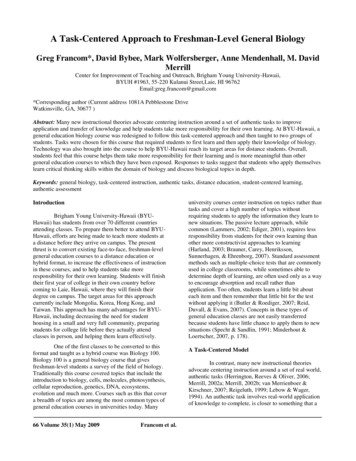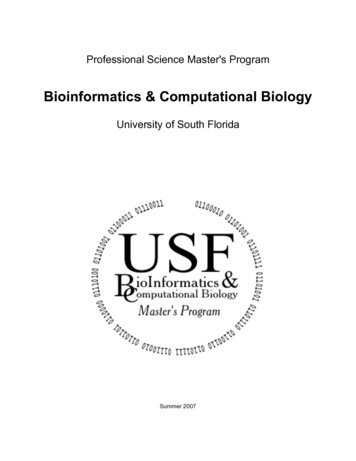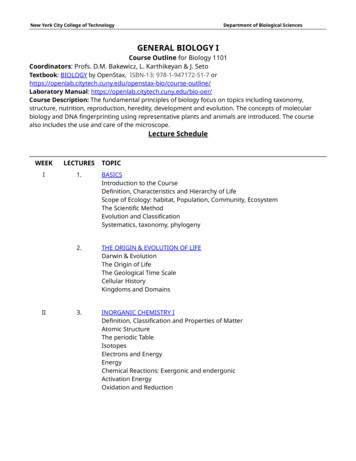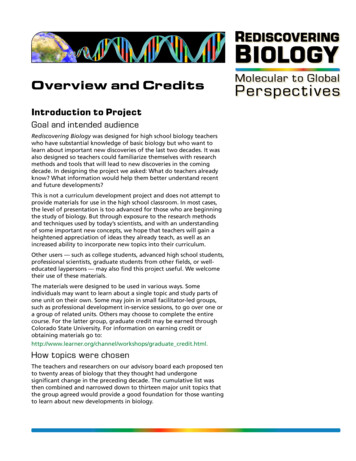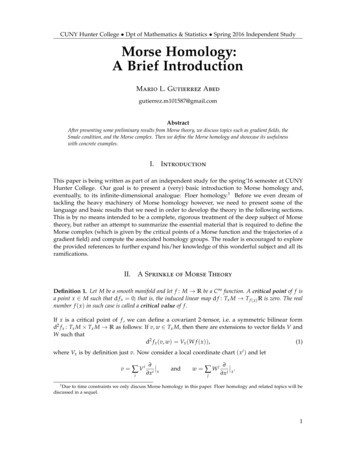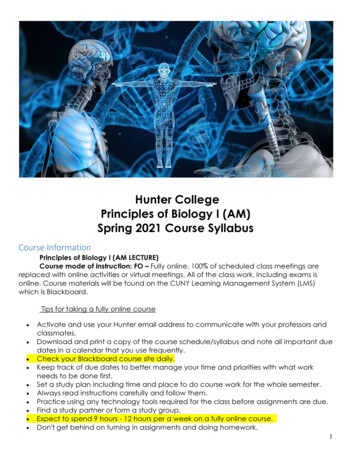
Transcription
Hunter CollegePrinciples of Biology I (AM)Spring 2021 Course SyllabusCourse InformationPrinciples of Biology I (AM LECTURE)Course mode of instruction: FO – Fully online. 100% of scheduled class meetings arereplaced with online activities or virtual meetings. All of the class work, including exams isonline. Course materials will be found on the CUNY Learning Management System (LMS)which is Blackboard.Tips for taking a fully online course Activate and use your Hunter email address to communicate with your professors andclassmates.Download and print a copy of the course schedule/syllabus and note all important duedates in a calendar that you use frequently.Check your Blackboard course site daily.Keep track of due dates to better manage your time and priorities with what workneeds to be done first.Set a study plan including time and place to do course work for the whole semester.Always read instructions carefully and follow them.Practice using any technology tools required for the class before assignments are due.Find a study partner or form a study group.Expect to spend 9 hours - 12 hours per a week on a fully online course.Don't get behind on turning in assignments and doing homework.1
Contact InformationCourse Lecturer: S. Sheppard-Lahiji, PhDCourse Lecturer Email: Sheppard@genectr.hunter.cuny.eduZoom sessions: by appointment onlyAdditional contact information for recitation and lab instructors will be located onblackboardCourse MaterialsTexts and course materials:o Required - Campbell Biology textbooko Suggested version: 12th edition Access card – 9780135987988§ If you have an alternative version of the textbook that isacceptable. Information for accessing the etextthrough our LMS is found on blackboard in the “StartHere” sectiono Labster (no purchase is required to utilize this material)o Primary Instructional technologies: Blackboard, Voicethreadand GradescopeCourse DescriptionPrerequisiteso MATH 125 and CHEM 102 or equivalento Consistent access to an electronic device with a stableinternet connectionOnline organizationo Lectures are asynchronous. Asynchronous means that the lectures will not beheld live during lecture time. The lectures will be provided as VoiceThreadvideos that will be accessible at the start of each lecture week. Please reviewthe course content on blackboard regarding how to engage VoiceThreadmaterial (found in course navigation).o Lecture exams are synchronous. This means that all lecture-based examsmust be completed during the lecture time during the specific date and timeprovided in the Online Lecture Course Schedule. Lectures times areMonday/Thursday from 8:10-9:25 AM EST. *Please note that the final does notrun during normal lecture time and adheres to the CUNY Finals bell schedule2
o Recitations are synchronous. You can attend as many recitations as youwant but all recitation-based assessments must be completed in your officialrecitationo Labs are synchronous. Please consult your specific lab instructor for anyinformation related to their lab assessments1.2.3.4.Learning OutcomesStudents will employ the scientific method to identify problems or questions, develophypotheses, design experiments to test hypotheses, and reach conclusions.Students will apply knowledge of molecular biology, DNA and protein metabolism tothe understanding of broad classes of pathologiesStudents will read and assess relevant biological literature and write short responsesabout the experimental work, conclusions and significance of the readings.Students will engage with the material and be active participants in theclassroom/communityCourse Calendar & ContentA checklist of Campbell key concepts to read will be available on blackboard. Some weeksmay have additional readings and articles that will be provided via blackboard. Additionaldetails regarding graded materials and rubrics will be provided via blackboard.Online Lecture Course ScheduleWeekdatesWeek 102/01-02/07Week 202/08-02/14Week 302/15-02/21Week 402/22-02/28Week 503/01-03/07Week 603/08-03/14Week 703/15-03/21Week 803/22-03/28Week 903/29-04/04Week 1004/05-04/11Week 1104/12 – 04/18Week 1204/19 – 04/25Textbook ReadingsAssessments & LearningActivitiesDue DatesChapters 2 & 3Chapters 4 & 5Chapter 6Chapter 7Chapter 8Lecture Exam 1Chapters 2-703/118:10-9:25 AM ESTChapter 9Chapter 12SPRING RECESSChapter 13Chapter 14Chapter 153
Week 1304/26 – 05/02Week 1405/03 – 05/09Week 1505/10 – 05/16Week 1605/17 – 05/23Lecture Exam 2Chapters 8,9,12-1404/298:10 – 9:25 AM ESTChapter 16Chapters 17/18FINAL EXAMNEW - Chapters 15-18Cumulative –Chapters 2-9, 12-145/209:00-11:00 AM ESTLecture content will be provided for asynchronous learning and is released at the start ofeach week. Lecture exams 1 & 2 are run synchronously within the official time frame of thelecture.Online Laboratory Course ing Term Begins)1234589101112No Classes(College Closed)15No Classes(College Closed)MarFriday16171819Intro to FoodIntro to FoodMacromolecules Macromolecules2526Cell StructureCell Structure222324Intro to FoodIntro to FoodIntro to FoodMacromolecules Macromolecules Macromolecules1234Cell StructureCell StructureCell StructureCell Membraneand Transport891011Cell MembraneCell MembraneCell Membraneand Transportand Transportand 5Enzyme KineticsEnzyme KineticsEnzyme KineticsLAB EXAM 1(all sections)Enzyme Kinetics2930311Spring recessSpring recessSpring recessSpring recess5Cell Membraneand Transport12CellularRespiration19Enzyme Kinetics262Spring recess4
(College Closed)(College Closed)(College Closed)(College Closed)(College Closed)56789Mitosis & Meiosis12Mitosis & Meiosis(2 separate sims)19MendelianInheritance26PolymeraseChain Reaction3Protein Synthesis13Mitosis & Meiosis(2 separate sims)20MendelianInheritance27PolymeraseChain Reaction4Protein Synthesis14Mitosis & Meiosis(2 separate sims)21MendelianInheritance28PolymeraseChain Reaction5Protein Synthesis15Mitosis & Meiosis1622236Protein Synthesis710111213141718Reading Day(2 separate sims)AprMay(2 separate sims)MendelianInheritance29LAB EXAM 2(all sections)MendelianInheritancePolymeraseChain Reaction30Protein Synthesis(No classes)Online Recitation Assessment ing Term Begins)12345891011Assessment 112No Classes(College Closed)1516Assessment 117Assessment 118Assessment 219Assessment 12223Assessment 22Assessment 39Assessment 424Assessment 23Assessment 310Assessment 425Assessment 34Assessment 411Lecture Exam 126Assessment 25Assessment 312Assessment 416Assessment 517Assessment 518Assessment 519Assessment 51MarFriday8155
2223Assessment 624Assessment 625Assessment 626Assessment 62930Spring recess31Spring recess1256Assessment 77Assessment 78Assessment 79Assessment 71213Assessment 814Assessment 815Assessment 816Assessment 81920Assessment 921Assessment 922Assessment 923Assessment 92627Assessment 1028Assessment 1029Lecture Exam 230Assessment 103451011Assessment 111718Reading Day(College Closed)AprMay(College Closed)Spring recess(College Closed)6Assessment 101213Assessment 11Assessment 11Last week of recitationSpring recess(College Closed)714Assessment 11(No classes)Grading MethodThis course utilizes a 1000-point grading systemExam 1Exam 2Final ExamGradescope Assessments Lab Material 15%15%30% (15% new material, 15% cumulative material)10% (assessments will take place during scheduledrecitations 11 assessment will be given and you candrop the lowest one)30% (Two lab exams 5% each, 15% lab quizzes given bylab instructor, 5% labster simulation completion---------100%6
Course Point StructureLECTURE & RECITATION: 700 ptsRecitation assessments will be administered by your recitation instructors and must be takenin your officially assigned recitation. Responses will be put in Gradescope and you willreceive a notification once you’ve been added to the Gradescope site.The first 2 Lecture exams are worth 150 pts each while the Final exam will be worth 300 pointsin total: 150 points of multiple choice questions from material not yet tested (materialpresented after 2nd exam) and an additional 150 points of cumulative multiple choicequestions. This cumulative portion will consist of multiple choice questions covering materialfrom the 1st and 2nd lecture exams.Please note: If your 150 pt cumulative exam score (from the Final exam) is higher than eitherof your first 2 lecture exam scores, the cumulative multiple exam score will replace the lowerof those exam scores (and count double). For instance, if you score a 120 on exam #1 anda 68 on exam #2, and you earn 141 points on the cumulative portion of the Final exam, wewill drop your score from exam #2 and count your 141 score twice. Your total will be 120, 141and141 ( your score from the non-cumulative portion of the Final exam which cannot bedropped).There will be no-back-tracking on any of the assessments provided through blackboard.LAB: 300 pts (30%)There will be two lab exams based on the simulation topics administered during the semester(Exam 1 on 3/25 and Exam 2 on 5/13) for 100 pts total. (These exams will take place duringyour lecture time from 8:10 -9:25 am EST on the two assigned Thursdays) The remaining 200points will be earned over the course of the semester as follows: You will earn 5 points eachfor the successful completion of the assigned Labster simulation regardless of your score onthe embedded quiz within the simulation (the points are just for completion). In addition, 15 pointscan be earned each week through quizzes administered at the start of each laboratoryperiod by your laboratory instructor (except for the week 4/9 - 4/15; during classes that week30 points can be earned since 2 simulations are being covered in a single class period.) 20points X 10 simulations (given over 9 weeks of laboratory class) 200 points.Communication§§Time zone for all online deadlines: Eastern Standard Time (EST)Content communication: VoiceThreads7
§§§Personal communication preference: Email (place course in subject)Estimated instructor response time to emails/VoiceThreads: will check weeklyEstimated instructor response time for assignment feedback 7-10 daysSyllabus Change PolicyExcept for changes that substantially affect implementation of the grading method andscale, this syllabus is a guide for the course and is subject to change with advancenotice. Any changes regarding the syllabus will be announced via blackboard.Online courses are subject to the same CUNY policies as in-person courses regarding academic integrity, theacceptable use of computer resources, equal opportunity and non-discrimination, sexual misconduct, workplaceviolence, domestic violence, and reasonable accommodations.Hunter College Academic Integrity Policy: Hunter College regards acts of academic dishonesty (e.g., plagiarism,cheating on examinations, obtaining unfair advantage, and falsification of records and official documents) as seriousoffenses against the values of intellectual honesty. The College is committed to enforcing the CUNY Policy onAcademic Integrity and will pursue cases of academic dishonesty according to the Hunter College AcademicIntegrity Procedures.ADA Policy: In compliance with the American Disability Act of 1990 (ADA) and with Section 504 of the RehabilitationAct of 1973, Hunter College is committed to ensuring educational parity and accommodations for all students withdocumented disabilities and/or medical conditions. It is recommended that all students with documented disabilities(Emotional, Medical, Physical and/ or Learning) consult the Office of AccessABILITY located in Room E1124 to securenecessary academic accommodations. For further information and assistance please call (212- 772- 4857)/TTY (212650- 3230).Hunter College Policy on Sexual Misconduct: In compliance with the CUNY Policy on Sexual Misconduct, HunterCollege reaffirms the prohibition of any sexual misconduct, which includes sexual violence, sexual harassment, andgender-based harassment retaliation against students, employees, or visitors, as well as certain intimate relationships.Students who have experienced any form of sexual violence on or off campus (including CUNY-sponsored trips andevents) are entitled to the rights outlined in the Bill of Rights for Hunter College.a. Sexual Violence: Students are strongly encouraged to immediately report the incident by calling 911, contactingNYPD Special Victims Division Hotline (646-610-7272) or their local police precinct, or contacting the College's PublicSafety Office (212-772-4444).b. All Other Forms of Sexual Misconduct: Students are also encouraged to contact the College's Title IX CampusCoordinator, Dean John Rose (jtrose@hunter.cuny.edu or 212-650-3262) or Colleen Barry(colleen.barry@hunter.cuny.edu or 212-772-4534) and seek complimentary services through the Counseling andWellness Services Office, Hunter East 1123. CUNY Policy on Sexual Misconduct8
Hunter College Principles of Biology I (AM) Spring 2021 Course Syllabus Course Information Principles of Biology I (AM LECTURE) Course mode of instruction: FO – Fully online. 100% of scheduled class meetings are replaced with online activities or virtual meetings. All of th
